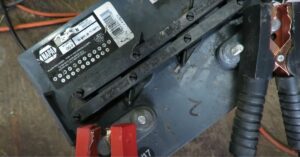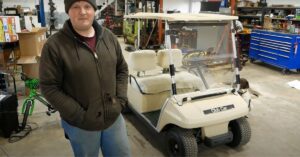why is my golf cart backfiring?
Are you tired of your golf cart backfiring and ruining your game? We’ve all been there – cruising along the green, enjoying a peaceful round of golf, when suddenly, BOOM! The loud noise echoes through the course, embarrassing us in front of our fellow players. But fear not, because we’re here to help you understand why your golf cart is backfiring and how to fix it.
The answer to the burning question “Why is my golf cart backfiring?” can be quite simple. Most often, this issue arises due to an improper air-to-fuel ratio in the engine. When too much fuel enters the combustion chamber or doesn’t burn completely, it can lead to those annoying backfires. Additionally, issues with spark plugs or exhaust systems may also contribute to this problem.
So why should you keep reading? Well, if you want to avoid further embarrassment on the course and regain control over your trusty golf cart’s performance, we have some valuable insights for you.
In this blog post, we’ll delve into common causes of golf cart backfiring and provide practical tips on how to troubleshoot and resolve these issues. Prepare yourself for a smooth ride ahead as we uncover solutions that will surely improve your overall
Key Takeaways
- Ignition timing issues: Incorrect timing can cause backfiring in golf carts.
- Fuel system problems: Clogged fuel lines or a faulty carburetor can lead to backfires.
- Exhaust system leaks: Leaky exhaust pipes or mufflers can result in backfiring.
- Engine misfires: Faulty spark plugs or ignition coils can trigger backfire events in golf carts.
How Does Backfiring Affect the Performance of My Golf Cart?
When it comes to your golf cart’s performance, backfiring can have a significant impact. Let’s dig deeper into how this issue affects your beloved vehicle.
Reduced Power
Backfiring can lead to a decrease in power output, making it difficult for your golf cart to reach its maximum speed or climb slopes effortlessly. This loss of power can be frustrating and hinder your overall experience on the course.
Poor Fuel Efficiency
Backfiring often indicates an inefficient combustion process, which means wasted fuel. As a result, you may notice that your golf cart requires more frequent refueling than usual. Not only does this increase costs but also interrupts the smooth flow of your game.
Engine Damage
If left unaddressed, backfiring can cause damage to crucial engine components over time. The sudden explosions during backfires put additional stress on parts such as the exhaust system and spark plugs, potentially leading to costly repairs down the line.
Noise Pollution
In addition to affecting performance and longevity, backfiring generates loud noises that disrupt tranquility on the golf course – not ideal when you’re trying to focus on your swing or enjoy a peaceful ride around the greens.
To ensure optimal performance and avoid these issues caused by backfiring, regular maintenance is key. Regularly inspecting and cleaning spark plugs, checking fuel filters and injectors, and keeping up with recommended service intervals will help keep backfires at bay.
What Are the Possible Causes of a Golf Cart Backfiring?
If you’ve been experiencing backfiring issues with your golf cart, it’s important to address the problem promptly. Backfiring can be caused by several factors, and understanding these causes can help you diagnose and fix the issue more effectively.
One possible cause of backfiring is an improper air-to-fuel ratio in the engine. This can occur if the carburetor is dirty or misadjusted, leading to either too much fuel or too little air entering the combustion chamber. Another potential culprit could be a malfunctioning spark plug or ignition system, which may result in incomplete combustion and subsequent backfires.
Additionally, a clogged exhaust system can also lead to backfiring as it restricts airflow and causes pressure buildup within the engine. Similarly, if there are any leaks in the exhaust manifold or muffler, unburned fuel may ignite within these components, resulting in backfire.
To diagnose and resolve these issues effectively, it is recommended to consult your golf cart’s manual for specific troubleshooting steps. Regular maintenance routines such as cleaning or replacing spark plugs and ensuring proper adjustment of carburetors can go a long way in preventing backfiring problems.
By addressing these potential causes of golf cart backfiring promptly, you’ll not only improve its performance but also extend its lifespan. So let’s dig deeper into each aspect to help you troubleshoot and resolve this issue efficiently.
Improper air-to-fuel ratio
Check for dirty or misadjusted carburetors that might be causing an imbalance. 2) Malfunctioning spark plug/ignition system: Inspect spark plugs and ignition components for any signs of damage or wear. 3) Clogged exhaust system: Ensure that your exhaust system is clean and free from obstructions. 4) Exhaust leaks: Examine the manifold and muffler for any cracks or holes that may allow unburned fuel to escape.
How Can I Troubleshoot and Fix Backfiring Issues in My Golf Cart?
If your golf cart is experiencing backfiring issues, there are a few troubleshooting steps you can take to diagnose and fix the problem. Let’s find out what could be causing this issue and how you can resolve it.
Check the spark plug
A faulty or worn-out spark plug can cause backfiring. Remove the spark plug and inspect it for any signs of damage or wear. If necessary, replace it with a new one that matches the specifications recommended by your golf cart manufacturer.
Clean or replace the air filter
A clogged or dirty air filter restricts airflow to the engine, which can lead to backfiring. Remove the air filter and clean it thoroughly using compressed air or replace it if needed.
Inspect the fuel system
Make sure there are no leaks in your fuel lines, and check that your fuel filter is not clogged. If you notice any issues, repair or replace these components as necessary.
Adjust carburetor settings
Improperly adjusted carburetor settings can cause backfiring problems. Refer to your golf cart’s manual for instructions on adjusting the carburetor properly or consider seeking professional help if you’re unsure.
Verify ignition timing
Incorrect ignition timing may also result in backfiring. Consult your manual on how to check and adjust ignition timing accurately.
Remember to take safety precautions while performing these troubleshooting steps, such as wearing protective gear and working in a well-ventilated area away from open flames.
Are There Any Preventive Measures to Avoid Golf Cart Backfiring?
If you’re wondering whether there are any preventive measures to avoid golf cart backfiring, the answer is yes! Taking a few simple steps can help minimize the chances of your golf cart experiencing backfires. Let’s dig deeper and explore some effective strategies that can keep your golf cart running smoothly.
Regular Maintenance
One of the most crucial preventive measures is regular maintenance. Ensure that you follow the manufacturer’s recommended maintenance schedule for your specific model. This includes routine inspections, oil changes, spark plug replacements, and air filter cleanings.
Fuel Quality
Using high-quality fuel is essential in preventing backfiring issues. Poor quality or contaminated fuel may lead to improper combustion and result in backfires. Always opt for reputable gas stations and consider using fuel additives designed to improve engine performance.
Check Ignition System
The ignition system plays a significant role in preventing backfires. Regularly inspect the spark plugs, ignition coils, and wires for any signs of wear or damage. Replace faulty components promptly to maintain proper ignition timing.
Exhaust System Inspection
A malfunctioning or damaged exhaust system can contribute to backfiring problems as well. Inspect the exhaust pipe, muffler, catalytic converter (if applicable), and gaskets regularly for leaks or blockages that could disrupt airflow.
Proper Driving Techniques
Your driving habits can also affect the likelihood of backfiring incidents on your golf cart. Avoid rapid acceleration or sudden deceleration as these actions put stress on the engine and increase the risk of misfires.
FAQs
What are some possible reasons for a golf cart backfiring?
Possible reasons for a golf cart backfiring could include issues with the spark plug, fuel system problems such as clogged filters or a malfunctioning carburetor, or an ignition timing problem. It is important to diagnose and address these issues to prevent further damage to the engine.
How can I determine if my spark plug is causing the backfiring?
To determine if a faulty spark plug is causing the backfiring in your golf cart, you can inspect it for signs of wear, such as excessive carbon buildup or damaged electrodes. Additionally, you can try replacing the spark plug with a new one to see if that resolves the issue.
Can fuel system problems lead to backfiring in a golf cart?
Yes, fuel system problems like clogged filters or a malfunctioning carburetor can cause insufficient fuel delivery or improper air-fuel mixture, resulting in backfiring. Regular maintenance of the fuel system and addressing any issues promptly can help prevent this problem.
Is it possible that an ignition timing problem is causing my golf cart to backfire?
Yes, an incorrect ignition timing setting on your golf cart’s engine can cause it to misfire and result in backfiring. Adjusting the ignition timing according to manufacturer specifications can help resolve this issue and improve overall performance.





